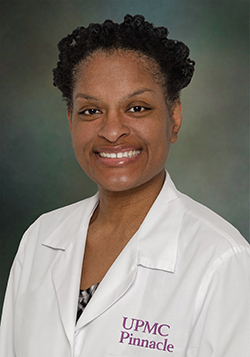Last Updated: Nov 2, 2020
 By Sharee Livingston, DO
By Sharee Livingston, DO
Dr. Livingston is a PAMED member and an OB-GYN with UPMC Pinnacle/OBGYN of Lancaster.
I decided to become an Obstetrician/Gynecologist because I wanted to “help” women. I also fell in love with the labor and delivery experience. What I failed to realize was the “other” side of Obstetrics. I was born and raised in the projects of Harrisburg. My single mother and older sister made my life as wonderful as they could with the meager means that we had. I had the opportunity to attend catholic school from first grade throughout high school. My desire for a catholic education carried on to St. Joseph’s University in Philadelphia. Four years later, I traveled a few blocks down City Line Avenue to the Philadelphia College of Osteopathic Medicine (PCOM) and earned a medical degree. While at PCOM and immersed in the Philadelphia culture, I learned the importance of community service. Community service is mandatory for any profession.
While practicing Obstetrics and Gynecology here in Lancaster, I co-founded Moms of Kids Advancing (MOKA Moms). MOKA Moms is a group of mothers who value social activities with moms and children of similar cultural backgrounds. MOKA Moms participated in many local and regional community service projects. Through my work with MOKA Moms, I learned of Patients R Waiting (PRW). Subsequently, I became a board member and organizer for this amazing organization. My appetite for community service was satisfied with PRW.
PRW is a non-profit organization whose mission is to eliminate health disparities by increasing diversity in medicine. We have three areas of focus: 1) to increase the pipeline of minority clinicians, 2) make this pipeline less leaky, and 3) support minority clinicians in practice. The PRW Board is made up of three black female Obstetricians/Gynecologists. Fellow PAMED member Cherise Hamblin, MD, founder of PRW, practices OB/GYN at Lancaster General Hospital Penn Medicine. Wendy Goodall-McDonald, MD, is an OB/GYN in Chicago. Not long into our many initiatives with PRW did the weight of the disproportionate health disparity that exists among patients of color rock our core.
PRW created the Diversifying Doula Initiative (DDI) in order to address maternal morbidity and mortality in people of color. The mission of DDI is to decrease maternal morbidity and mortality in people of color by increasing access to doula care. Because black women are four to five times more likely to die in childbirth than white women are, and Latina women rank closely to black women in this alarming statistic, we decided to start an initiative to decrease maternal morbidity and mortality.
DDI provides pregnant women of color with doula support. Doulas are non-medical support persons proven to improve birth outcomes, increase breastfeeding, and decrease cesarean section surgical deliveries. The DDI also trains black and Latinx people in Lancaster to become certified doulas, thus increasing diversity among doulas and supporting entrepreneurship for black and Latinx people in Lancaster.
We set out to initiate a program of support for black and Latina expectant mothers by black and Latinx doulas. As a new program, we spent significant time identifying local resources and collaborators. We promoted services to Women’s and Babies Hospital, UPMC Lititz Women’s Place, Lancaster Health Center, Healthy Beginnings Plus, Lancaster Prison facility, the Spanish American Civic Association, Planned Parenthood, and Women’s Way of Philadelphia, as well as promotion through social media and print materials.
 Each cohort undergoes an eight-week virtual training with two Doulas of North America (DONA)-certified doula trainers. Online training in breastfeeding and childbirth education follows. There is standardized required reading for DONA certification. The final part of the certification process culminates in a live hands-on training session performed by a DONA trainer, which took place at UPMC Lititz on Oct. 16-17, 2020.
Each cohort undergoes an eight-week virtual training with two Doulas of North America (DONA)-certified doula trainers. Online training in breastfeeding and childbirth education follows. There is standardized required reading for DONA certification. The final part of the certification process culminates in a live hands-on training session performed by a DONA trainer, which took place at UPMC Lititz on Oct. 16-17, 2020.
It is important to note that the American College of Obstetricians and Gynecologists (ACOG) supports doula care. ACOG and other organizations recognize the value of doulas to the pregnant patient, especially patients of color. Prior studies confirm a disparity in health care outcomes of expectant mothers who are socially disadvantaged in terms of their race and low income compared to those who are not. In the U.S., women of color and low-income women such as African Americans and Latinos have poorer birth outcomes (Thomas et al. Doula Services Within a Healthy Start Program: Increasing Access for an Underserved Population 2017). Doula support promotes healthier birth outcomes such as a higher newborn APGAR score, lower risk of birth complications, shorter labor period, and a higher likelihood to initiate breastfeeding earlier than a patient who is not assisted by a doula (Gruber et al. Impact of Doulas on Healthy Birth Outcomes 2013). The cost and lack of knowledge of doula support may be a limiting factor that creates this health care disparity in birth outcomes (Wint et al. Experiences of Community Doulas Working with Low-Income, African American Mothers 2019). Providing free doula support and education can help bridge the gap in health care for low-income women of color to experience better birth outcomes.
Due to the COVID-19 pandemic, the government has implemented social distancing measures, restricted large gatherings, and modified activity for some non-essential businesses, leading to further inaccessibility for doula services for women of color. Around 19.2 percent of Lancaster County’s population has filed for unemployment, thereby exacerbating the cost disparity present for women of color concerning access to doula services. The pandemic has affected how health care is provided, promoting an increase in telemedicine visits, and implementing visitor restrictions in outpatient and inpatient settings, including doulas.
The DDI team comprises a collaborative team of OB-GYNs, certified nurse midwives, DONA-certified doulas, medical students, and aspiring health care professionals. Having created this diverse team of health care professionals and aspiring health care professionals, most of whom are trained in women's health, and even more specifically, maternal health and well-being, ensures that we will be able to see our ongoing vision for DDI and have a meaningful impact on women of color in the greater Lancaster area. The skills, educational background, and experience of our team will lend itself to the success of our initiative.
The PRW DDI has already begun to demonstrate how impactful the project is and how it will continue to be impactful to women of color residing in the greater Lancaster area. With our current resources, we have already enrolled, provided the necessary educational resources, as well as started training 58 women of color in our free doula training program. In addition to this, DDI is currently in the process of providing free doula services from doulas of color to 15 pregnant low-income women of color who reside in the greater Lancaster area. Moreover, as advertising and visualization of our services continue to grow through developing organizational partnerships, we anticipate a steep incline in interest and subsequent participation in the near future. We are collecting data via a pre- and post- doula services survey concerning our expectant mother experience with their doulas, such that we may analyze the impact of our outreach.
As stated, I fell in love with the labor and delivery process. However, it is not lost upon me that adverse outcomes exist in Obstetrics. Therefore, it is ALL of our duty to work to decrease health disparities in maternal morbidity and mortality, especially among vulnerable women of color.
The Pennsylvania Medical Society does not have policy on the use of doulas.